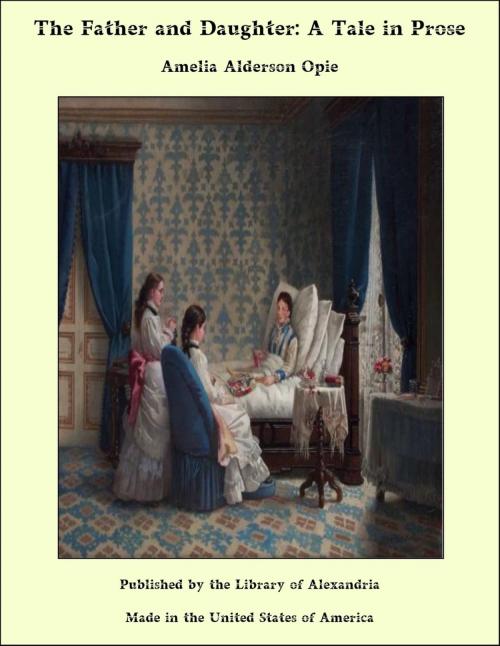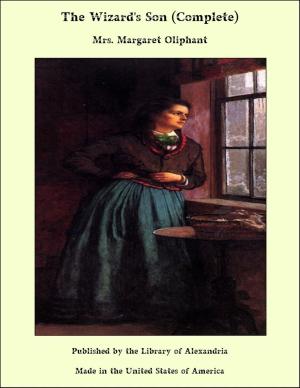The Father and Daughter: A Tale in Prose
Nonfiction, Religion & Spirituality, New Age, History, Fiction & Literature| Author: | Amelia Alderson Opie | ISBN: | 9781465510501 |
| Publisher: | Library of Alexandria | Publication: | March 8, 2015 |
| Imprint: | Language: | English |
| Author: | Amelia Alderson Opie |
| ISBN: | 9781465510501 |
| Publisher: | Library of Alexandria |
| Publication: | March 8, 2015 |
| Imprint: | |
| Language: | English |
The night was dark,—the wind blew keenly over the frozen and rugged heath, when Agnes, pressing her moaning child to her bosom, was travelling on foot to her father's habitation. "Would to God I had never left it!" she exclaimed, as home and all its enjoyments rose in fancy to her view:—and I think my readers will be ready to join in the exclamation, when they hear the poor wanderer's history. Agnes Fitzhenry was the only child of a respectable merchant in a country town, who, having lost his wife when his daughter was very young, resolved for her sake to form no second connection. To the steady, manly affection of a father, Fitzhenry joined the fond anxieties and endearing attentions of a mother; and his parental care was amply repaid by the love and amiable qualities of Agnes. He was not rich; yet the profits of his trade were such as to enable him to bestow every possible expense on his daughter's education, and to lay up a considerable sum yearly for her future support: whatever else he could spare from his own absolute wants, he expended in procuring comforts and pleasures for her.—"What an excellent father that man is!" was the frequent exclamation among his acquaintance—"And what an excellent child he has! well may he be proud of her!" was as commonly the answer to it. Nor was this to be wondered at:—Agnes united to extreme beauty of face and person every accomplishment that belongs to her own sex, and a great degree of that strength of mind and capacity for acquiring knowledge supposed to belong exclusively to the other. For this combination of rare qualities Agnes was admired;—for her sweetness of temper, her willingness to oblige, her seeming unconsciousness of her own merits, and her readiness to commend the merits of others,—for these still rarer qualities, Agnes was beloved: and she seldom formed an acquaintance without at the same time securing a friend. Her father thought he loved her (and perhaps he was right) as never father loved a child before; and Agnes thought she loved him as child never before loved father.—"I will not marry, but live single for my father's sake," she often said;—but she altered her determination when her heart, hitherto unmoved by the addresses of the other sex, was assailed by an officer in the guards who came to recruit in the town in which she resided.
The night was dark,—the wind blew keenly over the frozen and rugged heath, when Agnes, pressing her moaning child to her bosom, was travelling on foot to her father's habitation. "Would to God I had never left it!" she exclaimed, as home and all its enjoyments rose in fancy to her view:—and I think my readers will be ready to join in the exclamation, when they hear the poor wanderer's history. Agnes Fitzhenry was the only child of a respectable merchant in a country town, who, having lost his wife when his daughter was very young, resolved for her sake to form no second connection. To the steady, manly affection of a father, Fitzhenry joined the fond anxieties and endearing attentions of a mother; and his parental care was amply repaid by the love and amiable qualities of Agnes. He was not rich; yet the profits of his trade were such as to enable him to bestow every possible expense on his daughter's education, and to lay up a considerable sum yearly for her future support: whatever else he could spare from his own absolute wants, he expended in procuring comforts and pleasures for her.—"What an excellent father that man is!" was the frequent exclamation among his acquaintance—"And what an excellent child he has! well may he be proud of her!" was as commonly the answer to it. Nor was this to be wondered at:—Agnes united to extreme beauty of face and person every accomplishment that belongs to her own sex, and a great degree of that strength of mind and capacity for acquiring knowledge supposed to belong exclusively to the other. For this combination of rare qualities Agnes was admired;—for her sweetness of temper, her willingness to oblige, her seeming unconsciousness of her own merits, and her readiness to commend the merits of others,—for these still rarer qualities, Agnes was beloved: and she seldom formed an acquaintance without at the same time securing a friend. Her father thought he loved her (and perhaps he was right) as never father loved a child before; and Agnes thought she loved him as child never before loved father.—"I will not marry, but live single for my father's sake," she often said;—but she altered her determination when her heart, hitherto unmoved by the addresses of the other sex, was assailed by an officer in the guards who came to recruit in the town in which she resided.















